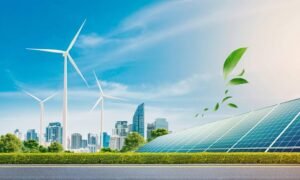hiimage In a bold move aimed at bolstering food security and promoting energy sustainability, the Egyptian government is making considerable progress in integrating renewable energy solutions into its agricultural development plans.
The emphasis on Renewable Energy Plans is becoming increasingly vital, particularly as fluctuations in global markets pose risks to the stability of food and energy resources.
In a recent high level meeting led by President Abdel Fattah El-Sisi, officials were encouraged to expedite the development of critical electrical infrastructure, especially for the nation’s significant agricultural reclamation endeavor, the “New Delta.”
This project is intended not only to boost agricultural output but also to support Egypt’s overarching objectives of achieving energy security and sustainability.
The “New Delta” Initiative: A Key Agricultural Strategy
The “New Delta” initiative stands as a cornerstone of Egypt’s food security strategy. As global economic uncertainties rise, ensuring robust local agricultural production has become increasingly essential.
The project aims to reclaim extensive areas of land for agricultural purposes, with a strong emphasis on increasing the country’s arable land.
This initiative is in line with Egypt’s broader vision of enhancing domestic agricultural production and decreasing reliance on food imports.
However, the ambitious nature of this project necessitates substantial energy resources. This highlights the critical role of Renewable Energy Initiatives.
Egypt has acknowledged the pressing need to incorporate sustainable energy solutions into its agricultural expansion efforts to guarantee the long term viability and success of the “New Delta” initiative.
As the energy requirements of the project are anticipated to grow, the government is prioritizing renewable energy sources to lessen dependence on non-renewable resources and to address environmental challenges.
A Strategic Meeting: Advancing Agricultural Zones through Renewable Energy Plans
During a meeting attended by senior officials, including Prime Minister Dr. Mostafa Madbouly and Minister of Electricity and Renewable Energy Dr. Mahmoud Esmat, along with representatives from the Armed Forces Engineering and Financial Affairs Authorities, the focus was on the advancement of electrical power supply to new agricultural zones.
The discussions particularly highlighted the development of transformer stations and the schedule for fulfilling the energy demands of these areas.
A significant outcome of this meeting was the Egyptian government’s unwavering dedication to ensuring a reliable energy supply for agricultural and industrial initiatives.
This commitment aligns with a broader national strategy aimed at securing consistent electricity for such projects, which is vital for achieving food security and energy sustainability in the nation.
The plans for renewable energy are integral to this strategy, guaranteeing that the energy utilized in agricultural zones is both sustainable and economically viable.
In support of the government’s objective to enhance the role of renewable energy in national development, the dialogue also addressed the importance of attracting investments in the energy sector.
Renewable energy has been identified as a promising area for both domestic and international investment, providing a robust foundation for the government’s sustainability initiatives.
The Egyptian government is diligently working to establish policies and infrastructure that will promote the expansion of renewable energy projects, ensuring they make a substantial contribution to the country’s energy portfolio.
i
Emphasizing Renewable Energy: A Vision for the Future
President El-Sisi’s instruction to accelerate the development of electrical infrastructure for agricultural reclamation projects highlights the essential role renewable energy will play in Egypt’s future.
The government’s focus on regularly updating the national energy security plan reflects its dedication to ensuring a consistent and dependent energy supply for significant initiatives like the “New Delta.”
A key component of this strategy is the government’s aim to enhance the proportion of renewable energy within Egypt’s overall energy portfolio.
The adoption of renewable energy sources, including solar and wind power, is anticipated to be crucial in fulfilling the energy requirements of Egypt’s expanding agricultural sector.
This shift will not only decrease the nation’s reliance on fossil fuels but also contribute to lowering greenhouse gas emissions, aligning with Egypt’s climate action objectives.
Egypt possesses considerable potential for renewable energy, particularly in solar and wind resources.
With its extensive deserts and abundant sunshine, the country is strategically positioned to emerge as a regional leader in renewable energy production.
This advancement will assist Egypt in achieving its ambitious renewable energy generation targets and support global initiatives aimed at addressing climate change.
Incorporating Renewable Energy into Egypt’s Agricultural Development
The incorporation of renewable energy into Egypt’s agricultural sector is a vital measure to ensure the sustainability of the “New Delta” project and other agricultural endeavors in the long run.
By utilizing solar, wind, and other renewable energy sources, Egypt can satisfy the energy requirements of its agricultural areas while reducing its environmental footprint.
Moreover, renewable energy solutions can provide power for irrigation systems, which are crucial for farming in arid regions, as well as for machinery and equipment used in cultivation. This will enhance the efficiency of agricultural practices.
Additionally, the development of renewable energy infrastructure in rural regions can foster economic advancement by generating employment opportunities within the clean energy industry.
This is especially significant in a nation like Egypt, where the energy sector is regarded as a fundamental component of national economic progress.
By prioritizing Renewable Energy Plans, Egypt can cultivate a more varied and sustainable economy while simultaneously meeting the increasing energy demands of the agricultural sector.
Expert Editorial Comment
In summary, Egypt’s emphasis on Renewable Energy Plans is vital not only for the success of the “New Delta” initiative but also for the nation’s long term growth.
By incorporating renewable energy solutions into its agricultural development strategies, Egypt is establishing itself as a frontrunner in sustainable development.
The government’s dedication to improving renewable energy infrastructure, attracting investments, and ensuring energy availability for essential national projects will contribute to a thriving future for Egypt’s agricultural and energy sectors.
As Egypt progresses in enhancing its agricultural capabilities and decreasing its dependence on non renewable energy sources, it is evident that Renewable Energy Initiatives will be instrumental in the country’s pursuit of food security, energy sustainability, and economic development.

